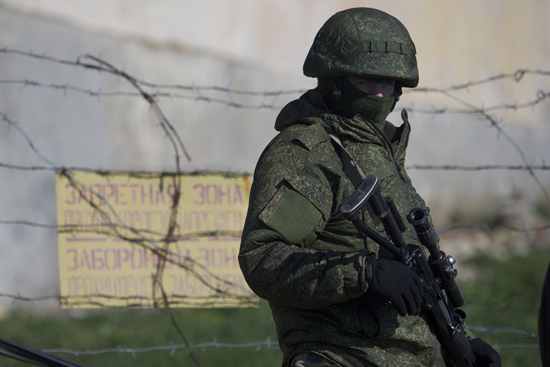Whither Ukraine?
CAS scholar on Russia’s incursion into its neighboring state

A Russian guard patrols a Ukrainian dock as part of the force President Vladimir Putin sent (and denied sending) to the embattled country. Photo by Associated Press/Ivan Sekretarev
A few weeks ago, the news out of Russia was all about the upcoming Winter Olympics in Sochi. By the closing ceremonies, all hell had broken lose in Ukraine. A West-leaning reform government ousted the Russian-allied president, Viktor Yanukovych, who fled the capital of Kiev in February, three months after protests first erupted about the announcement that the government was abandoning efforts to strengthen ties with the European Union. The Ukrainian Parliament relieved Yanukovych of his powers after he left and passed laws that ethnic Russians in the country opposed, such as removing Russian as an official language.
Attention then turned to what action Russian President Vladimir Putin might take in the Ukraine, an area of vital interest to his country. Russia stations its Black Sea Fleet in the Crimea region of Ukraine, which was a Soviet Union republic until gaining independence after the Soviet collapse more than two decades ago. Last weekend, Putin sent troops to occupy Crimea, citing threats to its Russian population that other Crimeans disputed. Putin has vowed not to push farther into the country, but he’s also denied that the troops there are Russian, a claim contradicted by on-the-ground reports. President Obama, who immediately demanded the troops’ withdrawal, is readying sanctions he hopes to impose on Russia with support from European allies.
What’s at stake in the Ukraine, for them and us, and what happens if it spirals out of control? We asked Igor Lukes, a College of Arts & Sciences professor of history and international relations and an expert on central Europe and Russia.
BU Today: Are any vital American interests at stake in Ukraine? Might we have to live with the status quo Putin is assembling on the ground?
Lukes: If I take the word “vital” seriously, my answer has to be: of course not. We have two oceans, in the East and West, and two friendly neighbors, in the North and South. Therefore, it would take a cataclysmic event to threaten vital American interests. But is the Ukrainian crisis important? Absolutely. Ukraine is a significant European country, and its neighbor, Russia, is even more important. If Ukraine is at some future point woven into the fabric of a democratic, stable, and prosperous Europe, its very success would be an existential threat to Russian dictators and an inspiration to the Russian people.

What do you think Putin is hoping to achieve by his troop movements—does Russia have a vital interest there or is this a psychological salve, reasserting his country’s importance?
Russia does have a vital interest in Ukraine. As long as Ukraine remains within Moscow’s orbit, Russia is a superpower. Without Ukraine, Russia is no more or less important than other European players, e.g., Sweden or Spain. There is nothing Russian leaders and a good number of their subjects regret more than the loss of their superpower status. Even their humiliating economic decline into poverty in the 1990s was less painful than the discovery that they no longer belonged to a superpower. This was quite apparent in 1999 during the NATO bombing of Russia’s ally Serbia.
Russia has had no reason to worry about access to its naval base in Crimea: a treaty guarantees it, and it’s enforced by the Russian fleet. The invasion was a provocative and destabilizing aggression against a soft target. It was an expression of Russian insecurity. It may have been motivated by metaphysical concerns, but it was an act of thuggishness.
American leaders halted trade talks and military operations with Russia earlier this week and are discussing a number of other options, such as boycotting this summer’s G8 summit in Russia, kicking the Russians out of the G8, freezing Russian assets abroad, and visa bans. Will any of these, or some other measure, persuade Putin to restrain himself?
Of course not. The United States is a military superpower, but its might is irrelevant in the present crisis. It is not a large enough business partner to threaten the Russian economy on its own: only a small percentage of Russia’s foreign trade reaches the US market. It is easy to predict that attempts at a political isolation of Russia will fail the moment Putin stops being supportive in those areas so dear to our Congress, e.g., Iran and Syria.
Some reporting suggests our European allies may be less eager to confront Russia than we are, because of trade and other ties with that country. Are we likely to get Europe’s help here?
The Western alliance that existed during the Cold War is no longer. Britain, Germany, and the Netherlands quickly warned that they would oppose sanctions. At least a decade ago, London replaced New York as the destination preferred by Russian oligarchs, billionaires, and multimillionaires. Russian citizens keep some $400 billion in EU banks, and most European countries depend on Russia for their oil, natural gas, and access to various strategic metals.
What dangers from an escalation of this crisis keep you awake at night? Is military action on our part out of the question?
What keeps me up at night? The Crimean crisis and its twin in eastern Ukraine represent a conflict between sovereignty over territory, which clearly belongs to Ukraine, and the ethnic composition of the people who reside there—many are Russians. This brings back memories. Hitler started World War II by insisting he had the right to annex parts of Czechoslovakia on the grounds that the people who lived there spoke German. When the French and British appeasers satisfied his demands at the Munich Conference in September 1938, he occupied the rest of Czechoslovakia in March 1939. Having run into no opposition in Crimea, Putin may well probe further in eastern Ukraine, then take the rest of the country.
I am haunted by the language Putin uses: he told George Bush in 2008 that “Ukraine was not even a country,” and he now claims to have acted in Crimea in support of Russians suffering at the hands of Fascists, neo-Nazis, and anti-Semites. This is taken straight from a speech by Stalin protégé Vyacheslav Molotov, who justified the Soviet invasion of Poland in September 1939 with similar words. When the Kremlin hints it may have to render “fraternal assistance” to the Russians beyond Crimea, I hear the language used by Soviet Premier Leonid Brezhnev to justify the occupation of Czechoslovakia in 1968.
Regarding a western military action in defense of the rest of Ukraine: it isn’t going to happen, and it should not. But for Washington to say so in advance might make further aggressive moves by Putin more—not less––likely.

Comments & Discussion
Boston University moderates comments to facilitate an informed, substantive, civil conversation. Abusive, profane, self-promotional, misleading, incoherent or off-topic comments will be rejected. Moderators are staffed during regular business hours (EST) and can only accept comments written in English. Statistics or facts must include a citation or a link to the citation.